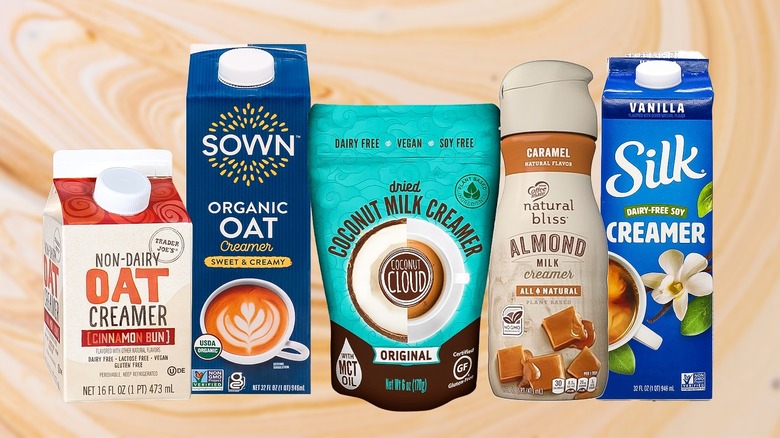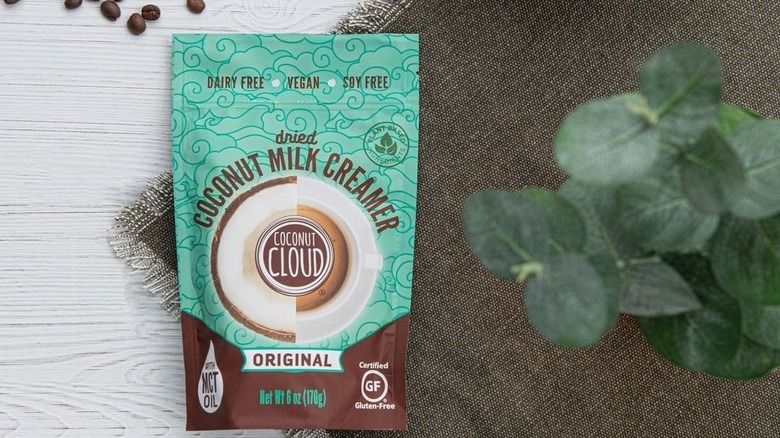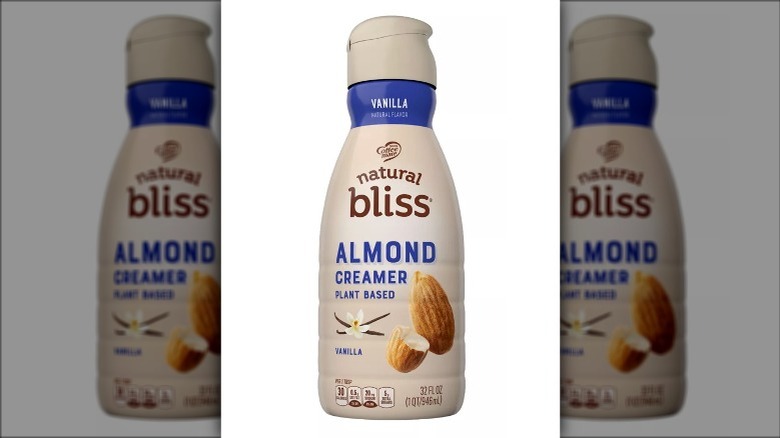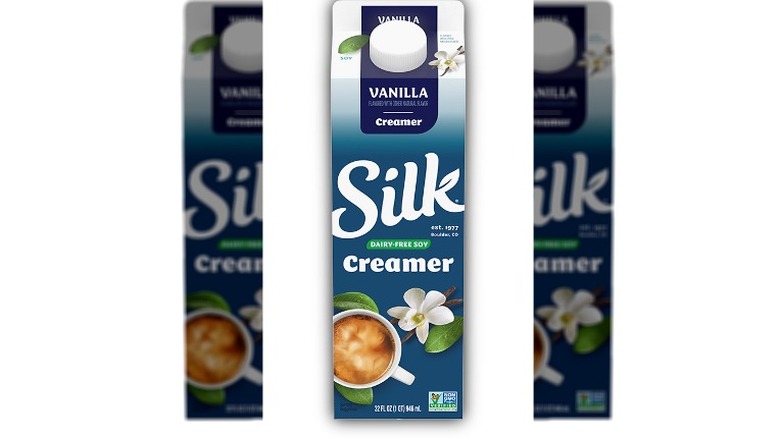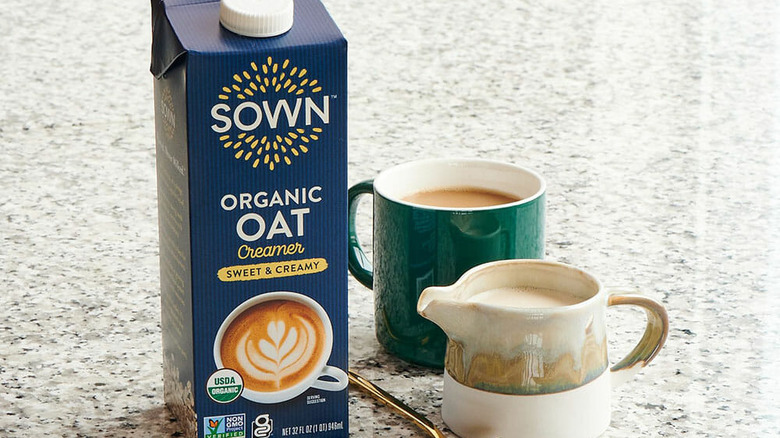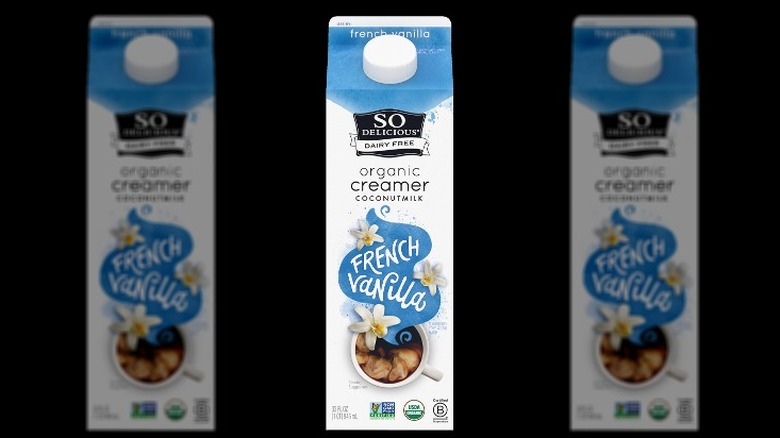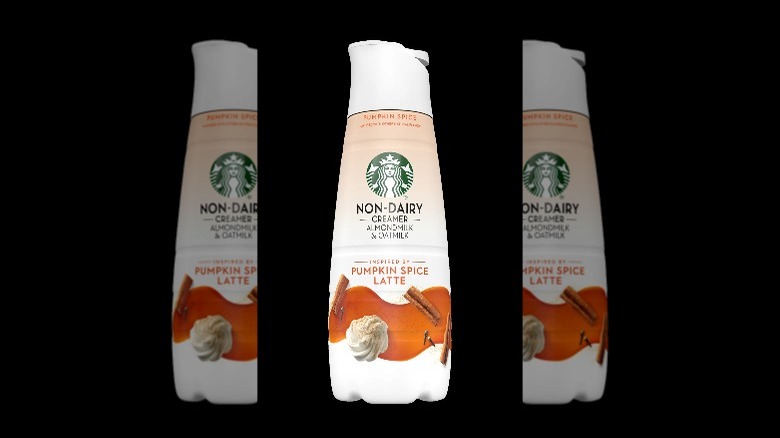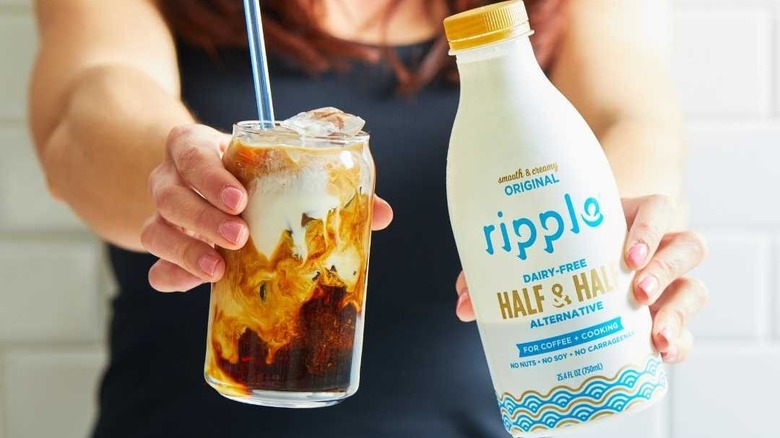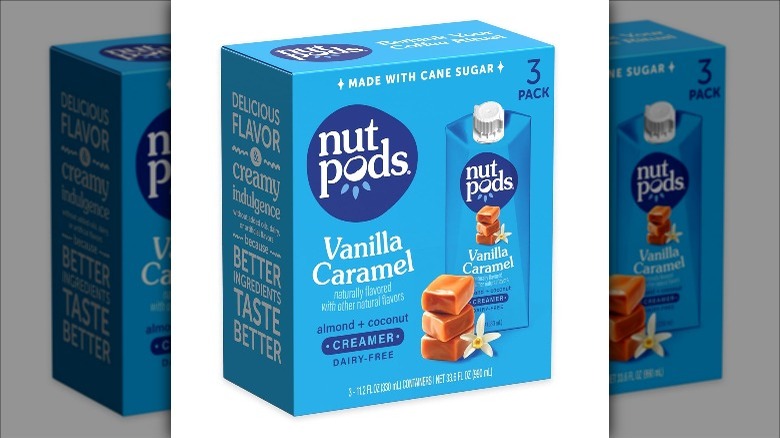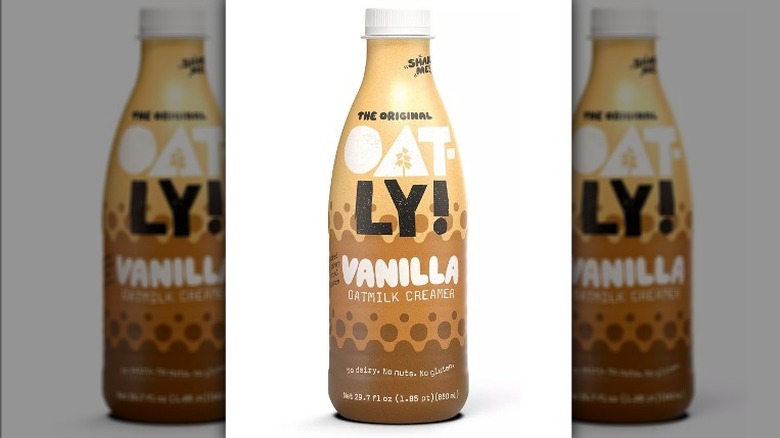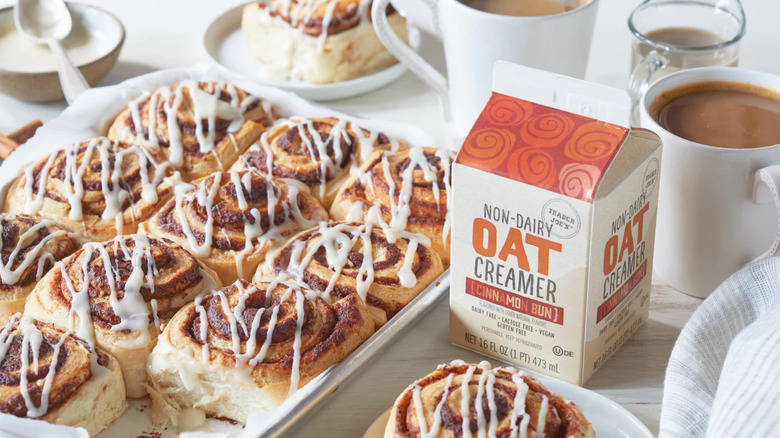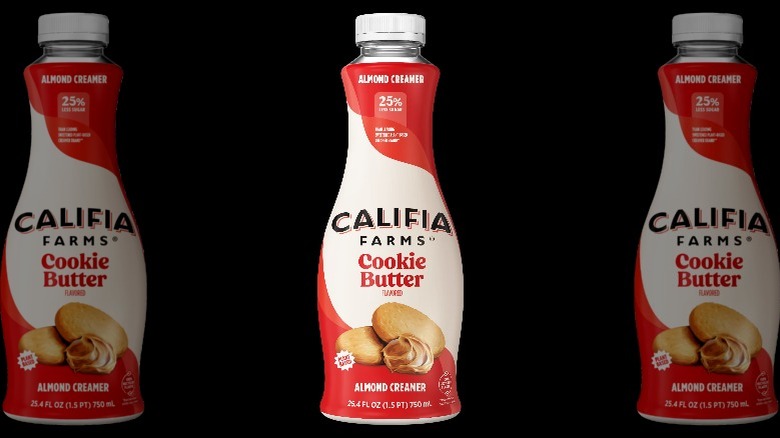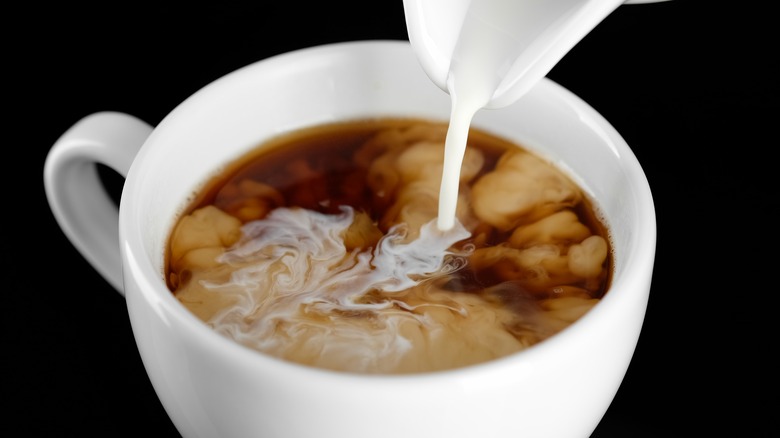11 Unhealthiest Non-Dairy Coffee Creamers Available At Grocery Stores
We may receive a commission on purchases made from links.
In the quest for the perfect cup of coffee, many of us turn to non-dairy creamers, whether we follow a plant-based diet or think they're a healthier choice than their dairy counterparts. But looks can be deceiving. Even with a base made with coconut, almond, soy, or oat, many of these creamers are packed with ingredients that are nowhere near good for you. From excessive sugar and fat to a cocktail of artificial additives, certain non-dairy creamers can do more harm than good. Considering that coffee on its own is low in calories and rich in antioxidants, negating its benefits by adding a non-dairy creamer that's loaded with unhealthy ingredients may not be the wisest choice.
In this article, we're diving into the unhealthiest non-dairy coffee creamers you can find at grocery stores. We've selected these creamers based on their high levels of unhealthy fats, added sugars, artificial additives, and overall caloric content. We'll dive into the details of this assessment at the end of the article. Whether you're a coffee lover or just enjoy an occasional cup, knowing what's really in your creamer can help you make more health-conscious decisions around your morning joe. Let's uncover the top offenders and see why these creamers should be avoided if you want to keep your coffee habit a bit healthier.
1. Coconut Cloud Original Coconut Milk Creamer
The packaging of Coconut Cloud Original Coconut Milk Creamer promotes its minimal processing as a healthier choice for consumers. While that is a good quality, one look at the nutrition label shows a non-dairy creamer that, in its market, is very high in calories, fat, and saturated fat. For every 1-tablespoon serving, this creamer packs a substantial 45 calories and 2.5 grams of fat, 2 of which are saturated fat. Keep in mind that many non-dairy creamers have only 10 to 15 calories per portion and no saturated fat. The higher fat and calorie content of this delicious but not-so-healthy dairy-free creamer can likely be attributed to a couple of its ingredients: coconut cream and MCT oil.
And it gets worse. This creamer doesn't even use whole coconut milk as its main ingredient. Instead, it uses a processed product, coconut cream powder, which contains the additive dipotassium phosphate. From a health perspective, this may be considered problematic by some, as phosphate additives have been linked to heart and kidney issues. Also, you may be left wondering what "minimally processed" really means if the primary ingredient is processed. All in all, for those who enjoy coconut flavor in their coffee, using pure coconut milk instead of a more traditional creamer would seem to be a healthier and more natural alternative.
2. Coffee Mate Natural Bliss Vanilla Almond Creamer
Coffee Mate is among the most popular brands of creamers, with many non-dairy options sold under the name Natural Bliss. While most are on the unhealthy side, the Natural Bliss Vanilla Almond Creamer is especially bad for you, with 30 calories, 5 grams of added sugars, and 0.5 grams of saturated fat in a single tablespoon. For perspective, that's 2% of the daily recommended saturated fat intake and 10% of the daily recommended sugar intake, all in a single cup of coffee.
While this may not seem like all that much in the grand scheme of things, it adds up when you're putting it in your coffee every day. Plus, those extra calories and sugars are added to each cup of coffee. So, if you have more than one cup per day or if you add more than 1 tablespoon of creamer, you'll have to double or triple those numbers. On top of that, the ingredients list is a little heavy on additives, including guar gum, natural flavor, and gellan gum. These additives are not known to cause any serious side effects or health issues, but consuming less processed foods overall aligns with a cleaner, more natural diet.
3. Silk Vanilla Soy Creamer
Silk's line of coffee creamers is completely dairy-free, making it a popular choice for those with lactose intolerance or a preference for plant-based diets. But its lack of dairy does not necessarily make it the healthiest choice, as many varieties can be high in sugars and additives. On the particularly unhealthy side is the Silk Vanilla Soy Creamer, which has 30 calories per serving, plus 0.5 grams of saturated fat.
It's also got a pretty heavy load of additives, including maltodextrin, soy lecithin, natural flavor, and dipotassium phosphate. Recent studies have found a link between maltodextrin and chronic inflammatory disorders like inflammatory bowel disease. Dipotassium phosphate has also been linked to kidney and heart problems. These types of emerging findings have led many people to avoid consuming foods with lots of additives whenever possible.
Another less-than-ideal ingredient in Silk Vanilla Soy Creamer is palm oil, a product that has raised concerns due to its association with deforestation, environmental degradation, and health implications related to its high saturated fat content. Even though adding this non-dairy creamer to your coffee can be delicious, you're probably better off choosing an option that is more nutritious and less controversial.
4. Sown Sweet & Creamy Organic Oat Creamer
It's a fairly common assumption that any food labeled organic must be pretty healthy, but that's not always the case. Take for example Sown Sweet & Creamy Organic Oat Creamer, which is far from the healthiest non-dairy creamer on the market. For every tablespoon of this plant-based creamer that you put in your coffee, you're adding 30 calories, 1 gram of fat, and 4 grams of sugar to your cup. This is not a big deal if you don't consume it every day, but if you add it to your coffee as a frequent ritual, you might want to think twice. Those calories, sugars, and fat accumulate faster than you might realize.
Having the word "organic" on a label may also lead to the misconception that the creamer is a clean, additive-free product. Unfortunately, this is not true. Sown Sweet & Creamy Organic Oat Creamer includes several additives on the ingredients list: calcium carbonate, potassium citrate, and gellan gum. While the purpose of these additives is to improve the health profile and texture of the creamer, their presence underscores the creamer's reliance on processing and enhancement through synthetic means, which can detract from its overall nutritional value.
5. So Delicious Dairy-Free French Vanilla Creamer
So Delicious Dairy-Free French Vanilla Creamer may seem like a healthy option since it boasts the word "organic" on its label, but it still poses several nutritional concerns. To start, this plant-based creamer is high in calories, saturated fat, and sugar, making it a less-than-optimal addition to a cup of black coffee. Specifically, it has 30 calories, 1 gram of saturated fat, and 4 grams of sugar per 1-tablespoon serving. Enjoying multiple cups of coffee throughout the day means these amounts will keep going up.
Glancing over the label, you'll also find that So Delicious Dairy-Free French Vanilla Creamer contains a variety of additives: potassium citrate, pea protein isolate, sodium citrate, gellan gum, and natural flavor. Each of these additives serves a functional purpose, such as enhancing texture, flavor, or shelf life. Still, their presence means the product is far from being a simple, whole-food item. Organic or not, the more additives in a product, the more processed it is. And the more processed it is, the higher the risk of potential harm to your health. If you're seeking a healthier option for your coffee, consider alternatives that emphasize simpler, more nutritious ingredients with minimal processing, such as plain old coconut milk.
6. Starbucks Non-Dairy Pumpkin Spice Latte Creamer
Let's be honest. When a product comes from Starbucks, most people probably don't assume it's the healthiest thing around. The chain is known for its fancy, dessert-like beverages, which are typically not associated with health-conscious choices. Starbucks Non-Dairy Pumpkin Spice Latte Creamer, a cult favorite throughout fall and winter, is no exception. Adding a single tablespoon equates to an extra 30 calories, 1 gram of saturated fat, and 5 grams of sugar. For some pumpkin spice lovers out there, this might be worth it, but for those looking to maintain a healthier diet, it's important to be mindful of these extra calories, fats, and sugars, which can add up before you know it if used regularly.
Starbucks Non-Dairy Pumpkin Spice Latte Creamer also contains several additives, like potassium citrate, guar gum, natural flavor, and gellan gum. Regularly consuming products with lots of additives can lead to potential health concerns over time and detract from a more natural and wholesome diet. To be fair, it isn't just Starbucks' beloved pumpkin spice creamer to watch out for as far as your health goes. It's generally true across the board that Starbucks' non-dairy creamers tend to be high in calories, sugars, and additives. Sure, they taste good, but at what cost?
7. Ripple Non-Dairy Half & Half
Ripple Non-Dairy Half & Half offers a lower calorie and fat content compared to many other non-dairy creamers on this list, with just 20 calories per 1-tablespoon serving and a complete absence of added sugars. However, despite these seemingly positive aspects, there's also the fat content to consider. At 2 grams of fat in each 1-tablespoon serving, this is higher than many of the other unhealthy non-dairy creamers on this list.
What's more, the extensive list of additives among ingredients raises concerns. This includes sunflower oil, pea protein, gum arabic, potassium citrate, sodium bicarbonate, natural flavor, sunflower lecithin, gellan gum, and mixed tocopherols. While the nutrition label may seem favorable at first glance, the presence of these additives suggests a highly processed product. This could undermine its positive qualities despite being lower in calories and sugar. So, if you're trying to keep it on the healthy side with your non-dairy coffee creamer, Ripple Non-Dairy Half & Half might not be the way to go. Opting for alternatives with fewer additives will keep your coffee habit much cleaner.
8. Nut Pods Dairy-Free Vanilla Caramel Creamer
Nut Pods Dairy-Free Vanilla Caramel Creamer uses actual almond and coconut milk as its base, which is better than a processed alternative. It also contains organic cane sugar, the purest and healthiest option if you're going to be consuming sugar. That being said, this non-dairy creamer can't exactly be called healthy. For one, it has 25 calories, 1 gram of fat, and 4 grams of sugar per 1-tablespoon serving. In and of itself, this isn't all that high, until you start putting more than 1 tablespoon in your coffee or if you drink several cups of coffee every day.
On top of that, if you read the ingredients list, you'll see a number of additives, including natural flavors, dipotassium phosphate, acacia gum, sunflower lecithin, guar gum, and gellan gum. Phosphate additives in particular have been linked to heart and kidney issues. The other additives, while generally considered safe, can be a point of concern for those looking to minimize their intake of processed ingredients. For example, "natural flavors" can be derived from a variety of sources and might not always be as natural as they sound. It's worth considering the possible cumulative health effects of additives like these, especially when consumed regularly. So, while Nut Pods Dairy-Free Vanilla Caramel Creamer is a tasty way to enhance your coffee, opting for a creamer with fewer additives might be a better choice for anyone prioritizing their health.
9. Oatly Vanilla Oatmilk Creamer
Oatly has a section of its website called "What Might Be Less Amazing," openly addressing that some of the ingredients in its creamers are less than ideal. This transparency is respectable, because at least Oatly isn't trying to hide anything from its customers. However, transparency doesn't change the fact that Oatly creamers may not be the most nutritious option. Its non-dairy Vanilla Oatmilk Creamer includes a fairly high sugar content at 4 grams per 1-tablespoon serving. Plus, every serving has 30 calories and 1 gram of fat, which are no small numbers for the non-dairy creamer market.
Reading over the ingredients list, you'll also find a bunch of additives, like natural flavor, sunflower lecithin, gum acacia, calcium carbonate, and gellan gum. It's true that these are common food additives that can help enhance flavor and texture, but they also contribute to the processed nature of the product. Overall, if you're having a morning cup of coffee and adding even just one serving of Oatly Vanilla Oatmilk Creamer, you're not necessarily getting the healthiest start to your day.
10. Trader Joe's Non-Dairy Cinnamon Bun Oat Creamer
Trader Joe's has grown to have a rather cult-like following over the years, and for good reason. The popular grocery store has a wide selection of affordable natural products compared to other stores that lean organic. For this reason, fans of Trader Joe's might not love seeing the Non-Dairy Cinnamon Bun Oat Creamer on this list of unhealthy non-dairy creamers, though it's here for a reason. Every 1-tablespoon serving contains 25 calories, 0.5 grams of fat, and 4 grams of sugar. These numbers aren't as high as some of the other non-dairy creamers on this list, but they're not low either, especially if you don't limit yourself to a single cup of coffee per day.
Additionally, if you check out the list of ingredients, you'll find quite a few additives: natural flavors, pea protein isolate, sodium bicarbonate, potassium citrate, gellan gum, and sunflower lecithin. Anyone using non-dairy creamer for health reasons might find this concerning, as consuming heavily processed foods doesn't align all that well with health-conscious eating. Sure, Trader Joe's Non-Dairy Cinnamon Bun Oat Creamer is delicious, but using it in moderation — truly just a splash per coffee — is probably best.
11. Califia Farms Cookie Butter Almond Creamer
Despite its decadent flavor, Califia Farms Cookie Butter Almond Creamer is not the unhealthiest non-dairy creamer on this list. It uses an almond milk base and cane sugar as sweetener, which is better than using processed products. That being said, it's also not the top choice of non-dairy creamer for anyone trying to be more health-conscious. Adding just 1 tablespoon in your coffee provides 20 calories, 1 gram of fat, and 3 grams of sugar. Plenty of other non-dairy creamers do worse as far as nutrition goes, but there are quite a few that do better as well.
Unfortunately, that's not the only reason to consider Califia Farms Cookie Butter Almond Creamer unhealthy. All the additives, such as sunflower lecithin, calcium carbonate, natural flavors, potassium citrate, guar gum, and gellan gum, don't help the matter either. If you're trying to prioritize your health with a non-dairy creamer, you're probably better off using straight almond milk instead of a product with such a long list of processed ingredients.
How we chose the non-dairy coffee creamers on this list
In compiling this list, we focused on several key criteria to identify creamers that may compromise overall healthfulness. These included high levels of fats, added sugars, artificial additives, and overall caloric content — elements that collectively contribute to a creamer's nutritional profile. We specifically considered if certain non-dairy creamers packed in more calories, sugar, and fats than you might expect from a small addition (just a single tablespoon!) to your morning coffee. While these elements might make your coffee taste better, they certainly add up if using more than one serving or if drinking several cups of coffee a day.
And then there's the ingredient list. We paid close attention to things like natural flavors (which can be a bit of a mystery in terms of what they actually contain), gums to improve texture, and various other additives. These ingredients are generally recognized as safe by the USDA, but they tend to indicate a more processed product that might not be the healthiest choice in the long run. Our goal with this list is to help you understand what you're putting into your body when you reach for that non-dairy creamer. By knowing what's in these products and how they could affect your health, you can make more informed decisions about what goes into your daily caffeinated brew. In the end, it's all about finding a balance between enjoying your coffee and supporting your overall health goals.
